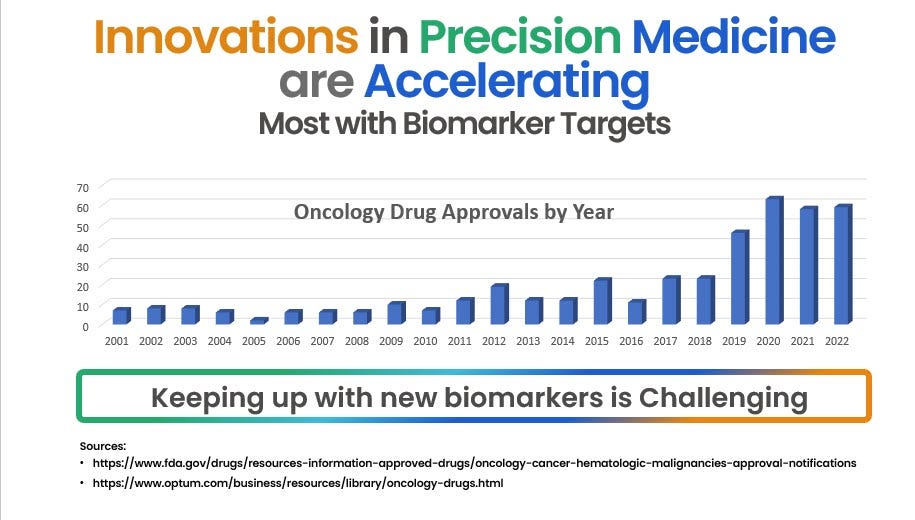I’m not a healthcare expert by any stretch except as an occasional recipient of care that I’m generally happy with.
As an observer, however, our system, in the US at least, looks fractured. Many people don’t have access to care. At the same time, significant innovations are racing along, but many physicians are likely too overwhelmed to incorporate new technologies like genomic testing. It probably feels like jumping on a moving train. Does that further increase the disparities in the system? How can we lower the risk and make it easier for doctors and healthcare systems to adopt advances like precision medicine to deliver better care?
In this episode, I talked to Jeff Owen, VP of Marketing at Genomic Testing Cooperative about their business model and how they are trying to make comprehensive genomic testing routine and more accessible.
There has been an explosion in biomarker-driven therapeutics.
Yet, pathologists have expressed dissatisfaction with bringing genomic testing in-house, even with the best kits and equipment, seeing it as a moving target.
The co-op model helps them keep pace by acting as a reference lab for systems with low test volumes, while guiding internalization, providing shared resources and education for higher-volume users. GTC manages the bioinformatics pipeline to simplify things further.
This can help drive down costs and increase the consistency of testing and results. And drive a revenue opportunity.
And a lot of pathologists are scared of next-gen sequencing because they think it's gonna take their job. And our company was founded by pathologists who understand that fear. But we also wanna show 'em maybe a different way of thinking about it, right? Because the next-gen sequencing is coming, right?
…you're trying to stop technology that's coming. It's kinda like maybe a lot of people with AI right now, they're afraid. But this is the new tc/pc (technical component/professional component with respect to billing) The reason pathologists like the tc/pc split is because it makes, it allows them to generate revenue for their hospital, which is oftentimes one of the things that is important for their employment, so to speak.
They have to generate a certain amount of money for their pathology department and the hospital to remain relevant… The margins are a lot better on next-gen sequencing than they are on some of the traditional routine pathology like immunohistochemistry.
The output of this testing is a recommendation to pathologists and oncologists on the best therapeutic options based on the specific genomics of a tumor. Ideally, by making this more accessible and implemented sooner for each patient, the right therapy can be prescribed earlier, improving outcomes.
Here is an example of how a business model can make a significant impact. I see a lot of life science or healthcare startups with innovative technologies or systems that are intended to improve patient care. But I see challenges around adoption and market penetration.
The co-op model gets around these by offering different paths based on volume and the benefit of a network effect. As more systems participate, more data can improve recommendations while each member of the co-op can share in new IP generated along the way.
GTC is conducting a Workshop, Chicago, September 23rd
Your deepest insights are your best branding. I’d love to help you share them. Chat with me about custom content for your life science brand. Visit Life Science Marketing Radio to learn more about how I help companies tell their stories.














Share this post